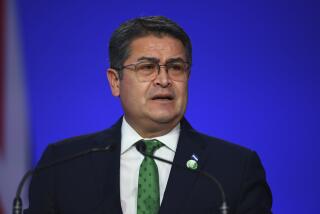‘El Chapo’ Guzman says he’ll do time in U.S., as long as it’s in medium security
Mexican drug lord Joaquin “El Chapo” Guzman is willing to accept extradition and plead guilty to charges in a United States court if he can negotiate an “unelevated” prison sentence in a medium security prison, his lawyer has told reporters here.
In an interview Thursday with Radio Formula of Mexico City, Guzman’s attorney, Jose Refugio Rodriguez, said that his client had decided to try to negotiate such a course of action because of what he described as poor treatment in the Altiplano prison where he is being held.
Prison guards are waking Guzman every four hours to verify that he hasn’t escaped, according to Rodriguez. The resulting stress and sleeplessness has caused the drug lord to suffer severe headaches, he added.
“Tell me what person could tolerate not sleeping,” he said.
Rodriguez said he had contacted an American attorney named William Stuttgart about negotiating terms of the extradition with U.S. authorities.
In a recent interview published in the Los Angeles Times, Guzman’s wife, Emma Coronel Aispuro, claimed that her husband’s prison treatment was inhumane and said his life was in danger.
Mexico’s Interior Minister Miguel Angel Osorio Chong refuted the charges in a radio interview this week.
“He is treated like what he is, a criminal, and he has security measures to avoid a possible escape,” the minister said. “There is no mistreatment, his human rights are respected, and we are only acting based on the prison’s regulations.”
Attorneys in at least seven U.S. jurisdictions would like to try Guzman on murder, drug trafficking and organized crime charges. As head of the Sinaloa drug cartel, Guzman directed the shipment of untold tons of cocaine, heroin and marijuana to the U.S. over a two-decade span.
U.S. law enforcement officials say he will be sent where prosecutors have gathered the strongest evidence, most likely New York or Chicago, according to some sources familiar with the discussions. Prosecutors in San Diego might also have a shot at trying Guzman, having filed the first charges against the drug lord in 1996.
The U.S. Department of Justice did not immediately respond to a request for comment. A spokesman for the U.S. Drug Enforcement Administration, which helped Mexican authorities track Guzman, said the case “is out of our hands.”
Guzman, one of the world’s most wanted criminals, was recaptured on Jan. 8 after a bloody shootout in the Mexican coastal town of Los Mochis after spending 11 months on the lam. He escaped from prison in July, his second escape from a maximum security prison, using a mile-long tunnel and with help from security guards.
The Mexican attorney general’s office announced the day after the capture that it had begun the process of extraditing Guzman to face charges in the U.S. The government had refused to consider such a move after Guzman was recaptured in February 2014 after more than a decade on the lamb following a 2001 escape.
On Jan. 23, Mexican President Enrique Peña Nieto said that he had ordered the attorney general’s office to “accelerate” the extradition process.
But even with a willing Mexican government, extradition could take years if Guzman decides to fight the process.
Sanchez is a special correspondent. Special correspondent Chris Kraul in Bogota and Times staff writer Alexandra Zavis in Los Angeles contributed to this report.
More to Read
Start your day right
Sign up for Essential California for news, features and recommendations from the L.A. Times and beyond in your inbox six days a week.
You may occasionally receive promotional content from the Los Angeles Times.





